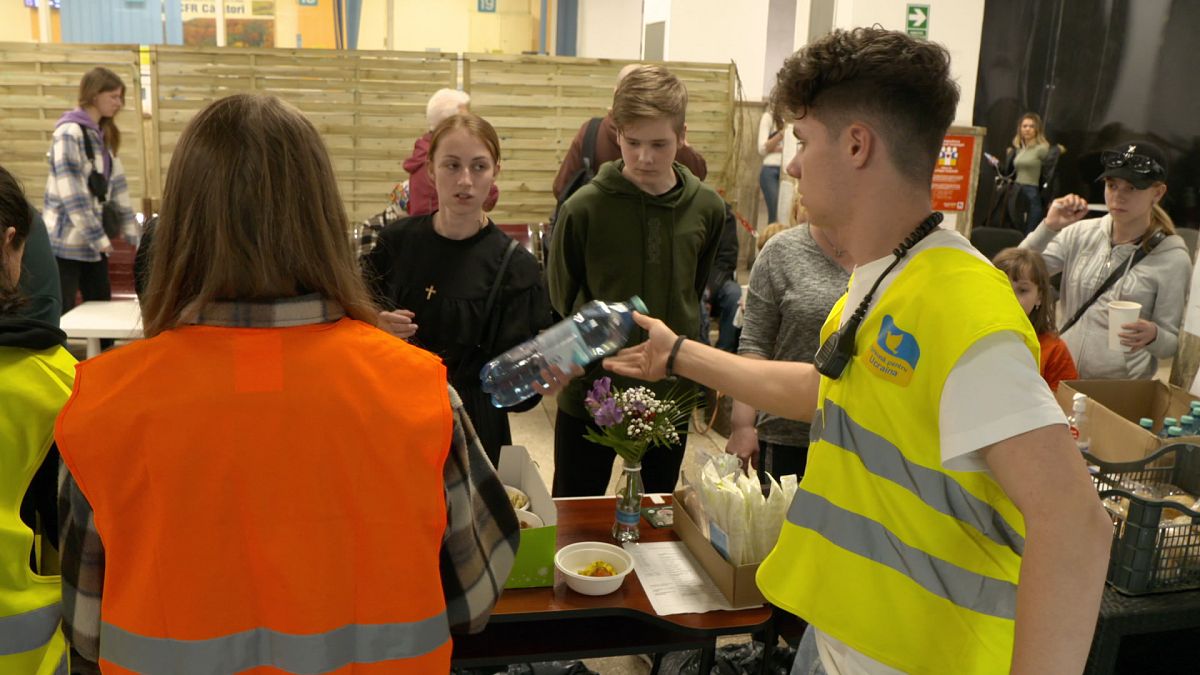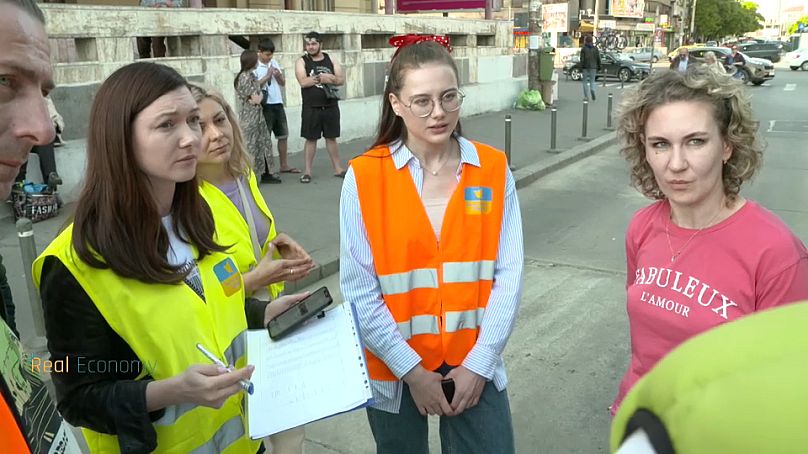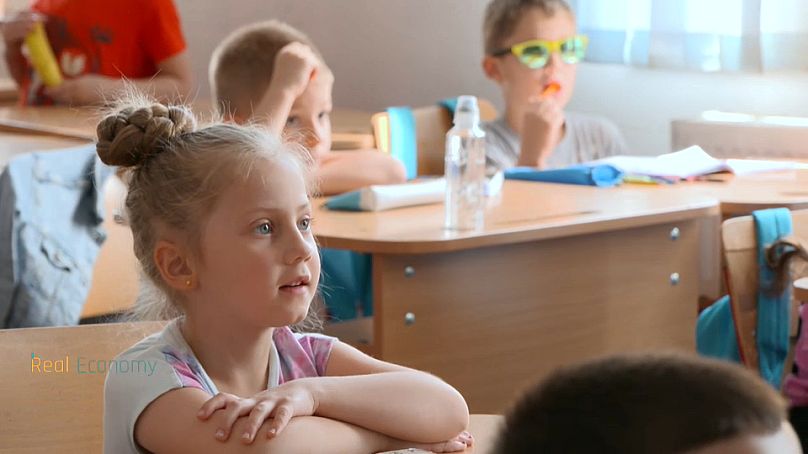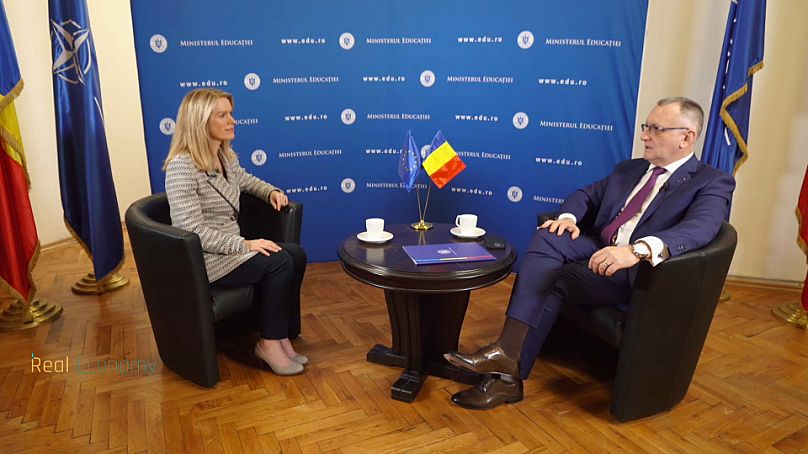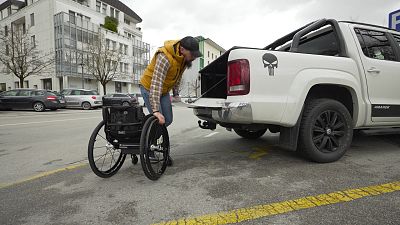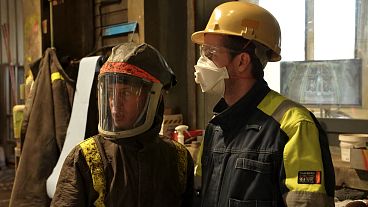With almost 6 million Ukrainian refugees fleeing to neighbouring countries, governments dealing with the cost of this humanitarian emergency are relying on EU funds to help those in most need, but are they enough?
An estimated 6 million Ukrainian refugees have fled across the border to neighbouring European countries since the beginning of Russia's war.
In this episode of Real Economy, we visit Romania to see how the country is dealing with the huge influx of Ukrainian refugees and speak to Romania's Education Minister about how they are helping refugee children continue their education.
We also take a look at which EU funds are helping member states deal with the cost of this humanitarian emergency and ask are they enough?
In an historic move, the EU has given people fleeing the war in Ukraine the right to live and work across the European Union for up to three years.
To help EU governments, the EU has freed up several billions in unused money for Europe’s regions. Known as the Cohesion Funds, this includes finance from the European Social Fund and FEAD, the European Fund set up to help the most deprived. These billions can now be spent on emergency help for Ukrainian refugees.
Budget made for peacetime
The money can be spent on items such as temporary accommodation, food, blankets and clothing as well as services including psychological counselling, medical care and education. National governments can claim back money already spent since the beginning of the war.
In addition, €10 billion of pandemic recovery funds known as REACT-EU is available. €3.5 billion has already been paid out to member states, with countries hosting the most refugees receiving the largest share of this.
Real Economy's Naomi Lloyd asked the European Commission’s Director General of Employment, Social Affairs and Inclusion, Joost Korte why the funding was money reallocated from other budgets, rather than fresh EU money to help cope with this crisis.
“The seven-year budget that started in 2021 was made for peace" Korte explained. "Nobody envisaged, as we were negotiating that budget, that there would be a war in Europe. I think it is fair to say that the budget that we have now wasn't really made for the situation in which we find ourselves."
The Director General underlined how they had quickly freed up money, saying "what the European Commission is doing is to use all the flexibilities, all the margins that are there in the budget. Where the European Union has much more funding available is in what we call the Cohesion funds."
"We've strongly motivated and encouraged the member states to use the money still there and made it very easy to spend it,” he concluded.
Korte explained why is there is still unallocated money in the budget.
"In fact it is possible for Member States until the end of 2023 to to spend money under the 2014-2020 programmes. So the seven year period is in fact almost ten years. That's why, as we speak today in 2022, there is still money there."
He clarified how Governments, NGOs and charities can access the money.
"We pay into the bank account of the member state and it is then for the member state to make sure that the beneficiary does indeed get the money that it's entitled to. And this we check. There is also a requirement for the Member States to make it very clear who is in charge and where they should go to and what the formalities for reimbursement are."
Major challenge
In the streets of Bucharest in Romania, Ukrainian flags can be seen everywhere, in a show of support and solidarity. Since the beginning of the Russian invasion, nearly 900,000 Ukrainians have entered Romania, and around 40% of these are children.
The main train station in Bucharest has been transformed into a centre for refugees. Managing this influx, is a major challenge for the country.
In a specially set-up waiting room, Ukrainian families wait for a bus to take them to their next stop: Germany. The transport is organised by a Romanian charity called ‘For Good’.
Since the beginning of the conflict, Alina and around twenty volunteers have been helping Ukrainian refugees.
Alina Dăscălescu, who is also the association’s president, said they provide food and clothes, shoes, and stuff for little babies, and are always in the search of financial backing.
“Right now we are planning to apply for private funds from Romania, but in the near future we are looking for some European ones.”
Unprecedented crisis
Save the Children Romania helped set up this facility. Its coordinator, Leonardo Andreescu says they have never faced a crisis on such scale before.
“I don’t think the Romanian authorities and the Romanian society as a whole, will be able to deal with this situation for a long period of time unless we receive some support from abroad.”
At the station, humanitarian organisations work alongside local authorities to assist and guide the incoming refugees.
Maryna left Odessa with her two children, and three other family members, but said their trip had become very dangerous.
“I was very afraid for my children, for my mother, my sister, all my relatives. The volunteers told us that there is a room here where we can eat, where our children can play. The children really liked this room, they play ball with the volunteers, there are psychologists. They didn't want to leave, that's why we stayed, to wait until the children could recover a little, emotionally, “ she says.
Vital help for children
Support for NGOs and government departments is vital for helping child refugees. Out of the total Ukrainian refugees who entered Romania, around 80,000 have stayed, including approximately 36,000 children.
In a Bucharest primary school, Anastasiia Konovalova, also a Ukrainian refugee, has set up eight classes thanks to the classrooms made available by the Romanian Ministry of Education.
“We now have 264 children, and about 900 in the waiting list. All these kids came here because they need education, and they want to get education in Ukrainian. We’re opening a new school next week and all teachers here have been volunteering for two months, we raised money for salaries on Go Fund Me,” she says proudly.
Alena Palesika arrived two months ago with her sons. The youngest comes here to school, to study but also to play with other children.
“We are very happy with the teachers, and with the team in general, and we help them as much as we can. We are very grateful to Romania, to this country and to all these people who help us, in these very difficult times.”
Alena dreams of returning home, as does Anastasiia, who is already organising the reconstruction of their school in Ukraine.
How 'Educated Romania' is helping Ukrainian refugee children
The Romanian government estimates that it has spent almost €72 million on emergency help since the beginning of the war, with no end to the conflict in sight. Frontline countries like this find their public finances stretched, but the EU has some available help.
The Romanian government adapted legislation early on so that all Ukrainian refugee children are able to have exactly the same rights as Romanian children.
Sorin Mihai Cîmpeanu, the Romanian Education Minister explained how the country's educational reform project, known as 'Educated Romania' is being used to help Ukrainian children continue their education.
"In Romania, we have a unique opportunity: the “Educated Romania” project, initiated by the president, aims for a profound reform of the educational system. We have 3.6 billion Euro budget for education reform. The existence of this project means we are able to offer better and more efficient integration and support for Ukrainian children. EU Commission collaborations, and EU funds we have at our disposal, including those outside the recovery and resilience plan, are also sources of finance."
The Minister explained that there are teams of professionals across Romania ready to help integrate the refugee children.
"At county level, we have in Romania a task force made out of the school inspector, teachers, and very importantly, counsellors, because psychological counselling for these children is important. "
The main challenge in the current situation, especially for minors arriving from conflict areas, is a lack of Romanian language skills, says the Minister.
"The only hurdle to overcome is the linguistic barrier which is why Romanian authorities are concentrating efforts on providing Romanian language classes."
